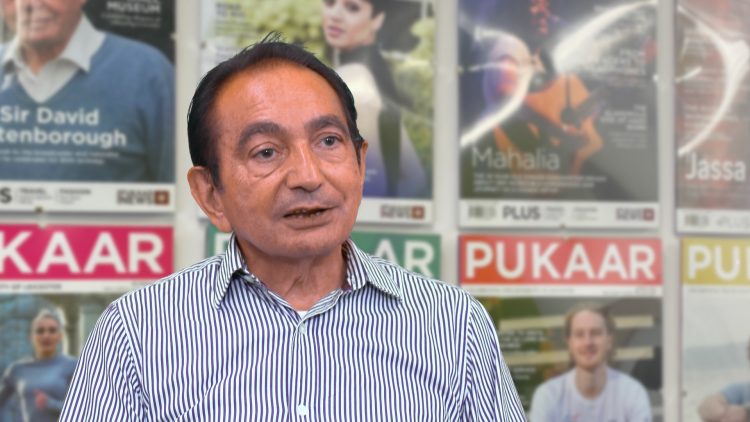Subhash Tejura was 21-years-old – married and working alongside his father in the family’s general store when his life was turned upside down, and he witnessed unspeakable horror in his hometown of Masaka, Uganda…
Subhash was one of thousands of Ugandan Asians who were expelled from Uganda in 1972, on orders of the brutal military dictator Idi Amin.
They had just 90 days to leave their home country – everything they owned and everything they knew behind…
Now 72, and living in Leicester, Subhash paints an idyllic picture of Masaka, Uganda, the place where he grew up happily, alongside five brothers and seven sisters…

He describes it as the ‘heaven of Africa’, a place where food grew in abundance and people greeted one another in the warm, kind sun.
However, all that was ripped apart with the shocking announcement which was made by Idi Amin and the sudden heartbreak which ensued.
At first, Subhash refused to believe it was true, he told the Leicester Times, before recalling the horror, hostility and heartbreak, which engulfed his community.
“When it was announced, at first we just ignored it. We thought, he’s just bluffing”, he revealed.
“Then one day, one of the town’s Mayors was kidnapped by the army. They took him to one of the taxi stands and they just chopped his hand.
“He said ‘just leave me alone’ and I remember, he was crying”, he continued. “Then they took him to the army barracks and just cut his stomach – took all his intestines out. He was killed immediately.
“That’s when we thought, we are not safe anymore. If something like that can happen to the Mayor, it can easily happen to us. It was very inhumane. It shook everyone up”.
Subhash paints an ugly picture of carnage in his once peaceful town – the kidnapping of a close friend who was ‘bunged into a car’ never to be seen again, and brutal soldiers who were relentless and remorseless in their pursuit of suffering.
“There was a lot of torture and many ladies were raped”, he recalls.
“There was no law there. It was very difficult to talk to army people, they were very rough. They would just walk into your house and ransack you – take whatever they wanted”.
Amid the horror, Subhash’s family fled their home and traveled to Kampala, the Ugandan capital, where documents were sorted, and families were split apart.
Some of his family were sent to India and others travelled to Leicester.
Subhash and his wife were sent to Switzerland initially, before moving to the city six months later.
He still recalls the heartbreak of leaving behind his home, his friends, and his beloved dog Jack, something which remains a very painful memory still to this very day.
“In Masaka I had a pet dog, and that was my biggest heartbreak”, he said. “I had to leave it with my home helper.
“We had to leave everything and that was very hard.
“Between Masaka and Kampala there were eight army check posts and they would check you every ten miles” he explained.
“If you were carrying suitcases or goods, they would just throw all the stuff on the floor and ask you to get out of the car. Then they’d give you five minutes to put your goods back, and whatever they liked, they would just take away”.
Over 50,000 Asians were expelled from Uganda in total, arriving in the UK with little-to-nothing to their names.
All bank accounts were frozen on order of Idi Amin.
Despite the painful ordeal, and the emotional turmoil which resulted however, Subhash remembers settling into Leicester quite quickly, and being well received in the city, where he has lived for the past 46 years.
Although he found it difficult to secure work initially, he eventually got a job working for British Rail, before being given a council house and having a family – two boys of his own.
Before his retirement four years ago, Subhash worked as a Physio Therapy Assessor for the NHS, a job he enjoyed for 16 years.
“Once I got the job I just stuck with it”, he said.
“I never had any problems in Leicester. I just mixed in. Because of my nature I can just fit in with anybody”.
This year marks 50 years since the expulsion of Asians from Uganda, and Subhash finds himself reflecting quietly on the past and the traumatic situation which he found himself in as a young 21- year-old, trying to find his place in the world.
This Summer, he has plans to visit a exhibition being held at Leicester Museum and Art Gallery, which will mark the anniversary of the exodus, but is also designed to celebrate the contribution the Asian community has made to Leicester’s culture and community in the years since.
“I have mixed feelings about the 50 year celebration. On one hand, it’s a great opportunity for people to get together – people you haven’t seen for years. But the sad part is that we had to leave everything there in Uganda” said Subhash, reflecting on the situation.
In the future, he has considered the possibility of taking his grandson over to Uganda, to show him his birthplace – a place which he remembers fondly for its warm weather, ripe fruit – and of course the happy memories he enjoyed before terror arrived and tore it all apart.
By Louise Steel



